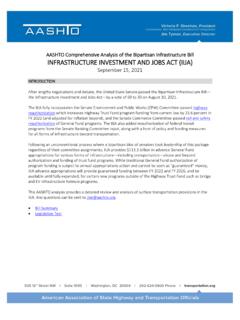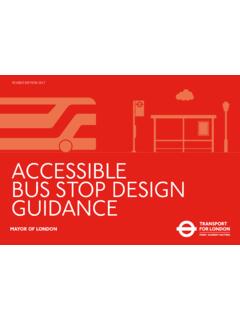Transcription of Shared Revenue Estimates: State Revenue Allocations to ...
1 Updated January 22, 2019 The California Local Government Finance Almanac Shared Revenue Estimates: State Revenue Allocations to Cities and Counties Local Streets and Roads Estimates: 2018-19, 2019-20 Including highway Users Tax Account (HUTA) and Road Maintenance and Rehabilitation Account (RMRA) The State of California imposes per-gallon excise taxes on gasoline and diesel fuel, sales taxes on gasoline and diesel fuel and registration taxes on motor vehicles with Allocations dedicated to transportation purposes. These Allocations flow through the highway Users Tax Account (HUTA), the familiar gasoline tax revenues that have been in place for decades, and the Road Maintenance and Rehabilitation Account which allocates much or the Revenue from the Road Repair and Accountability Act of 2017 (SB1 Beall).
2 California taxes on motor vehicle fuels include the gasoline tax, diesel fuel tax, and the use fuel tax. Taxes on aircraft jet fuel are transferred to the State Aeronautics Account. Taxes on fuel used for other motor vehicles are transferred to the State highway Users Tax Account include: The gasoline tax and diesel fuel tax imposed on the use of vehicle fuels at the rate of 13 cent per gallon for diesel fuel and 18 cent per gallon for gasoline, which includes the 9 cent per gallon rate added by Proposition 111 (1994). The use fuel tax is imposed on vendors and users of motor vehicle fuels that are not taxed under either the gasoline or diesel fuel tax, such as liquefied petroleum gas, ethanol, methanol and natural gas (both liquid and gaseous) for use on State highways. Use Fuel Tax rates vary depending on the type of fuel.
3 Variable rate per gallon gasoline diesel fuel excise taxes imposed in 2010-11 in a complicated arrangement known as the fuel tax swap. The fuel tax swap replaced the previous Proposition 42 sales tax on gasoline. Other transportation taxes are allocated to cities and counties through the Road Maintenance and Rehabilitation Account (RMRA) which allocates Revenue from the Road Repair and Accountability Act of 2017 (SB1 Beall) to local streets and roads and other transportation uses. Revenue allocated through the RMRA includes: An additional 12 cent per gallon increase to the gasoline excise tax effective November 1, 2017. An additional 20 cent per gallon increase to the diesel fuel excise tax effective November 1, 2017 with half of the revenues going to the State Trade Corridor Enhancement Account (TCEA) and half to the RMRA.
4 An additional vehicle registration tax called the Transportation Improvement Fee with rates based on the value of the motor vehicle effective January 1, 2018. An additional $100 vehicle registration tax on zero emissions vehicles of model year 2020 or later effective July 1, 2020. The Road Repair and Accountability Act of 2017 (SB1 Beall) also adopted annual inflationary adjustments to all per-gallon motor vehicle fuel excise taxes including the rates allocated through the highway Users Tax Account (HUTA). 2217 Isle Royale Lane Davis, CA 95616-6616 Tel 2 of 12 22 January 2019 highway Users Tax Account (HUTA) Revenue Allocations Streets & Highways Code Sec 2103-2108 HUTA Cities and counties receive Revenue from the motor vehicle fuel taxes imposed pursuant to Revenue and Taxation Code Section 7360(a) and (b) through the highway User Tax Account under the following formulas outlined in the Streets and Highways code and illustrated in Figure 1.
5 Section 2104. Section 2104 allocates funds to counties with designated allotments for engineering and administration, snow removal, heavy rainfall / storm damage as well as county streets, roads and public mass transit guideways and facilities. Section 2105. Section 2105(a) allocates percent of the tax revenues in excess of 9 cents per gallon ( the Proposition 111 rate) monthly among counties based on population. Section 2105(b) allocates percent of the tax revenues in excess of 9 cents per gallon ( the Proposition 111 rate) monthly among cities based on population. Section 2106. Revenues equal to cents per gallon are allocated as follows: a. $ million per year to the State Bicycle Transportation Account. b. $400 per month to each city ($2,308,800 per year among the 481 eligible cities1) c.
6 $800 per month to each county ($556,800 per year among the 58 counties) d. The residual amount to each county and the cities in that county based on registered vehicles. In each county, from this amount, the county receives an allotment based on the share of assessed value of the county which is in the unincorporated area. The remainder is allocated to the cities within the county based on population. 1 The city of Rolling Hills has only private streets and is therefor not eligible to receive these Allocations . Page 3 of 12 22 January 2019 Section 2107. This section provides monthly Allocations to cities of cents per gallon of gasoline, cents per gallon of diesel, and cents per liquefied petroleum gas (LPG), as follows. a. Each city with snow removal costs in excess of $5,000 is allocated 50 percent of the cost exceeding $5,000.
7 B. The remainder is allocated to cities based on population. Section These funds (about $ million per year) are allocated to cities annually in July based on population as follows: Section funds must be used for engineering costs and administrative expenses related to city streets. Cities with populations under 10,000 may also expend the moneys for street construction or acquisition of street rights-of-way. Section 2103 HUTA and the 2010 Gasoline Sales Tax Excise Tax Swap In March 2010 as a part of a special budget session called by Governor Schwarzenegger, the Legislature enacted a swap of State sales taxes on gasoline for a gasoline excise tax. Intended to be Revenue neutral, the fuel tax swap provided the Legislature with greater flexibility in the use of funds, in particular relieving the general fund from the cost of State transportation debt service payments.
8 The fuel tax swap: 1. Repealed the State sales tax on gasoline (local rates including the Bradley Burns are NOT affected); 2. Increased the excise tax on gasoline by cents and added an annual adjustment mechanism intended to ensure the new excise tax provides, over time, the same amount of revenues expected from the sales tax on gas (no more, no less); 3. Increased the sales tax on diesel by percent and allocates 75 percent to local transit agencies and 25 percent to State transit programs. The excise tax on diesel is reduced from 18 cents to cents. Sales tax revenues from diesel must go to transit funding. 4. Provided for a specific allocation of the funds among State and local transportation needs. Revenues from the new Section 2103 excise tax rate are now allocated as follows: 1.
9 State transportation debt service; 2. Remainder allocated: a. 44 percent to the State Transportation Improvement Program (STIP); b. 12 percent State highway Operation and Protection Program (SHOPP); c. 44 percent evenly split between cities and counties using current HUTA formulas. Section 2103 funds are allocated to cities on a per capita basis and to counties 75 percent based on the proportion of registered vehicles and 25 percent based on the proportion of maintained county road miles. City Population Annual Allocationover 500,000$ 20,000100,000 to 500,000 $ 10,00050,000 to $ 7,50025,000 to 49,999$ 6,00020,000 to 24,999$ 5,00015,000 to 19,999$ 4,00010,000 to 14,999$ 3,0005,000 to 9,999$ 2,000less than 5,000$ 1,000 Streets & highway Code 4 of 12 22 January 2019 The law includes expressed legislative intent to fully replace the local streets and road funds cities and counties would have received under Proposition 42 State sales tax on gasoline with Allocations from the new higher motor vehicle excise tax (HUTA) rate.
10 However, the swap created certain Revenue effects related to the timing and receipt of revenues. In particular, the law provides that the new excise tax rate be adjusted annually by the BOE to garner an amount of revenues equal to what Prop42 would have provided in the prior year. Thus, the annual Sec 2103 funds are always looking backward. If the Section 2103 amounts generate less than Prop42 would have, the difference will not be made up until the following year. In the years following the swap, there were a number of snafus and changes in interpretation of the Section 2103 allocation. In FY2011-12 SCO allocated more money to cities and counties and did not fully backfill State transportation programs for weight fees that were used for debt service and loans that those funds would have otherwise received.




